Posted January 12, 2023 by Nicky in Reviews / 2 Comments
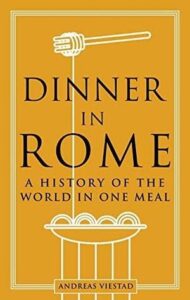 Dinner in Rome: A History of the World in One Meal, Andreas Viestad
Dinner in Rome: A History of the World in One Meal, Andreas Viestad
For a history of the world, this falls a little short. The world looks very much like the Roman Empire here, except a couple of brief nods to prehistoric humans and what they ate. There are whole chapters that mention nothing but the lands previously included in the Roman Empire. I don’t necessarily blame the author for this — it’s his choice, of course, to pick a cuisine he knows, and to pick the particular dish he ate, but it’s quite possibly the publisher’s choice to give it a misleading title. “A history of Europe” might’ve been more accurate.
Which is not to say I disliked the book as a whole: I enjoy the idea of taking an ordinary, everyday thing — like a good meal in a restaurant in Rome — and digging into every aspect of it to find its history. Food is, as Viestad points out, absolutely essential to it, and many people and nationalities build identities around it. (Even erroneously, as he discusses in the case of pasta carbonara, which is not an ancestral Italian dish, but quite possibly a fusion of Mediterranean-style diets with the wants of American soldiers during World War II.) It’s an enjoyable endeavour, and I found reading it very soothing and enjoyable. I do like a good carbonara myself, and Viestad describes his beautifully.
I didn’t even find his autobiographical allusions annoying, because it is useful to see his experience of lemons in the context of his having farmed them and his nostalgia about the lemons on his little, commercially non-viable farm. It’s useful to get the flavour of the restaurant in general, the people, the way Italian diners behave — all of this is part of the picture he’s trying to build up, demonstrating the way food and how we treat food gets ingrained in us.
His sources are not explicitly referenced with numbered footnotes, but he does have a nice sources section (the temptation to call it “Sauces” passed him by) and in general I found it enjoyable: a relaxed history about everyday things.
Just… not a history of the world.
Rating: 4/5
Tags: Andreas Viestad, book reviews, books, history, non-fiction
Posted June 10, 2022 by Nicky in Reviews / 0 Comments
 Hidden Hands: The Lives of Manuscripts and Their Makers, Mary Wellesley
Hidden Hands: The Lives of Manuscripts and Their Makers, Mary Wellesley
Hidden Hands is a book about manuscripts, and more than that, about the people behind the manuscripts. It’s not necessarily about the most beautiful or most impressive manuscripts, or the rarest, though it discusses manuscripts from all those categories. Wellesley isn’t just interested in the contents of the manuscripts, but also the people who composed the words, the scribes who wrote the actual script, the owners of the manuscript, and the potential readers of them.
I was familiar with most of the manuscripts mentioned, to the point where I’d have been interested in hearing more about the Pearl/Gawain manuscript or something for once, rather than the Beowulf manuscript yet a-fucking-gain. There were a couple of surprises too, though, like the discussion of the collection of letters from a particular family and how some of them were illiterate and thus the anxiety about the use of scribes. I’m not sure I’d normally count a collection of letters as a manuscript, but it was still an interesting section.
I also knew nothing about Gwerful Mechain, a medieval Welsh poet who wrote erotic poetry and protests against the misogynistic poetry circulating in her day. She was a definite and welcome surprise to me (as was the mention of a scholar who taught me, Katie Gramich).
All in all, I felt like there was so much to say that it would have merited a longer book, one which I would’ve read eagerly!
Rating: 4/5
Tags: book reviews, books, history, Mary Wellesley, non-fiction
Posted January 15, 2022 by Nicky in Reviews / 0 Comments
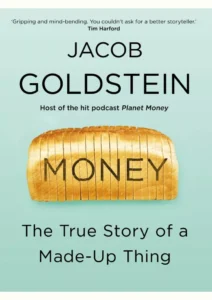 Money: The True Story of a Made-up Thing, Jacob Goldstein
Money: The True Story of a Made-up Thing, Jacob Goldstein
Money: The True Story of a Made-up Thing is exactly what it says on the tin. It’s not an exhaustive history, or a manifesto for any particular path forward. Rather, it’s a series of stories about money in different time periods, which in aggregate tell us something about how money developed and how its been seen over time. It includes some really clear explanations of why the gold standard isn’t ideal, why the financial situation in Greece was a potential disaster for the euro, etc; it makes things which I thought were complicated sound really simple by breaking them down and demystifying them.
However, it’s worth noting that it doesn’t have footnotes. There are endnotes, which are not traditionally formatted but do point to some sources… but not nearly enough and not really specific enough to be able to say “ah, this assertion came from here, which I can read for myself”. It’s breezy and light and definitely intended for someone like me who is only very mildly interested in the topic, and it does well at being appealing for that audience. Others with more knowledge will no doubt find it shallow/overly-simplified/etc.
Rating: 4/5
Tags: book reviews, books, history, Jacob Goldstein, non-fiction
Posted December 31, 2021 by Nicky in Reviews / 0 Comments
 The Darkening Age, Catherine Nixey
The Darkening Age, Catherine Nixey
The Darkening Age is a very readable book about a very depressing subject: the loss of knowledge, art and culture from the classical world when Christianity became mainstream. You often hear people saying that Christian monasteries preserved classical knowledge and literature, and it’s true — there are manuscripts which only survived because they were held in monasteries.
Unfortunately, as Catherine Nixey discusses at length, much more was destroyed by Christianity. Deliberately, purposefully, and with malice. Temples were torn down, books burned, inscriptions destroyed, etc, etc. If Christianity had truly been such a preserving force, we’d have a lot more than we do now, perhaps. Nixey goes through it step by step, the initial period of co-existence (and the fact that evidence suggests Christians were not persecuted nearly as much as they liked to think they were) and then the ramping up of hostilities, the sanctioned-and-encouraged utter destruction of “pagan” idols and temples, etc.
For such a heavy subject, it really is a very readable book, and I pretty much tore through it. It gets perhaps a bit repetitive, and other reviews are right to point out that there were other causes of the loss of texts, destructions of temples, etc.
The author is a journalist, rather than a historian, and the text is pretty much uninterrupted by footnotes/sourcing, so definitely be aware that it’s very much a popular history, and flavoured by opinion, rather than being an academic work. I found it an absorbing read!
Rating: 4/5
Tags: book reviews, books, Catherine Nixey, history, non-fiction
Posted December 29, 2021 by Nicky in Reviews / 0 Comments
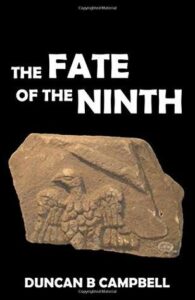 The Fate of the Ninth, Duncan B. Campbell
The Fate of the Ninth, Duncan B. Campbell
I’ve always been fascinated by the Ninth Legion, at least ever since I can remember, because of Rosemary Sutcliff’s The Eagle of the Ninth (a story that I’m pretty sure was told to me until I could read it myself, though my mother liked Warrior Scarlet best). This is obviously less thrilling, since it’s non-fiction, and there’s a lot of detail about how the Roman army worked, etc… more than I could remember in one go, really: in some ways, I kinda just took the author’s word for it about the minutiae.
It did make me sad to learn from this book that the origin story of The Eagle of the Ninth is based on a wrong interpretation of an archaeological find– the eagle found in Silchester was more likely decorative, perhaps on a fort, rather than being the eagle of a legion.
Despite destroying the basis of a favourite book, I did enjoy this. It pieces together the story of the IX Hispana through the textual records they left behind — their stamps on tiles, the name of the legion on commemorative stones that discuss the careers of various Roman consuls and other officials — rather than through more exciting archaeology. If you’re not super interested in how Roman inscriptions can help date historical events, or the IX Hispana legion, it might not be of much interest, though! It’s a little dry for that.
Rating: 3/5
Tags: book reviews, books, Duncan B. Campbell, history, non-fiction
Posted December 27, 2021 by Nicky in Reviews / 0 Comments
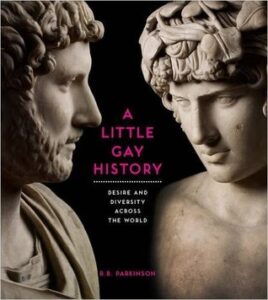 A Little Gay History, R. B. Parkinson
A Little Gay History, R. B. Parkinson
This really is a little book, but it’s still interesting. It uses the British Museum’s collections (with a little bit of help from the British Library) to discuss how same-sex desire has been portrayed in art and literature. It’s not an exhaustive account, and many cultures leave no mark: I’d say it’s best viewed as highlighting some interesting objects (and some of the lacunae where we can’t say), rather than as any kind of complete narrative.
For me, there wasn’t a lot that I didn’t know about, or which surprised me if I didn’t, but it’s a good opportunity to get a closer look at the objects: the images are full-colour, and most pages enlarge some of the interesting details to take a closer look. The focus is on gay men, partly due to the limitations of any collection and the general invisibility of women in the archaeology of certain periods, but there are some references to genders outside the binary, and to portrayals of female same-sex desire.
It’s worth noting that quite a few of the images are explicit. In addition, some of them are Greek/Roman, so some of the men portrayed are teenage boys (since there were sanctioned and encouraged relationships between boys and older men).
Rating: 4/5
Tags: book reviews, books, history, non-fiction, queer fic, R.B. Parkinson
Posted December 21, 2021 by Nicky in Reviews / 0 Comments
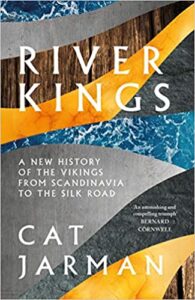 River Kings, Cat Jarman
River Kings, Cat Jarman
River Kings touches on a few topics surrounding the Vikings that I haven’t read much about elsewhere: their role in creating and maintaining the slave trade, for one, and then a brief (but fascinating to me) reference to using bioarchaology to understand the spread of disease, including a theory that the Vikings helped to spread leprosy and smallpox. I’d love to read more about that (in pretty much any period, to be honest).
The format of the book is fairly simple: Jarman chooses an item from a dig in Britain, at Repton, and follows its path to where it may have originated. How did a carnelian bead make its way from the east to Britain? The story allows her to touch on a lot of topics along the way: first the Vikings’ presence in Britain, and then their raiding and trading in general, and then further back along the bead’s journey. She explores the customs and capabilities of the Rus (Vikings by another name), and their role in affairs in Constantinople and beyond.
It’s a pretty effective structure to explore a bit more about what the Vikings did and why. It doesn’t cover all possible topics, but nor does it limit itself too much. I found it pretty enjoyable.
Rating: 4/5
Tags: book reviews, books, Cat Jarman, history, non-fiction
Posted November 15, 2021 by Nicky in Reviews / 0 Comments
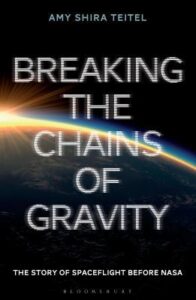 Breaking the Chains of Gravity: The Story of Spaceflight Before NASA, Amy Shira Teitel
Breaking the Chains of Gravity: The Story of Spaceflight Before NASA, Amy Shira Teitel
The problem with the early history of missiles, which came to enable space exploration, is apparently that it’s mostly about Nazis. Wernher von Braun ends up being the main focus of the narrative because he was deeply involved in rocketry all along, and unfortunately the author takes a tone that sees him as a visionary, nobly defending his precious and important project…….. by becoming a Nazi, accepting slave labour to assist in building it, and — she doesn’t mention this, somehow, mysteriously — being accused along the way of actively helping to torture prisoners.
Many ordinary people got caught up in the Nazi party, but most of them wouldn’t try to defend themselves by claiming their project was too important to abandon. Hiding behind the importance of his project is what skeeves me out more than anything with von Braun — and what skeeves me out with Amy Shira Teitel is how little she bothers to grapple with that fact. You’re writing about a Nazi, and that requires careful handling, and for the love of God you should not be suggesting that the ends (protection of the missile programme) might justify the means (the brutal use and torture of prisoners), even inadvertently. You should be so careful about that that the accusation could never arise.
Amy Shira Teitel… was not. Her enthusiasm for rocketry is clear, but her judgement is sorely in question. In addition, because I could not possibly care less about fucking Nazis, I found a lot of the book difficult to read and frankly tedious. Oh! It’s another explanation of how clever von Braun is and how carefully he protected his team of scientists from dying in the war! What a shame he couldn’t do anything about the torture and deaths that facilitated his programme.
Uggghhh.
Rating: 2/5
Tags: Amy Shira Teitel, book reviews, books, history, non-fiction, science
Posted November 9, 2021 by Nicky in Reviews / 0 Comments
 Spitting Blood: The History of Tuberculosis, Helen Bynum
Spitting Blood: The History of Tuberculosis, Helen Bynum
I was enthusiastic for this book, because I’m enthusiastic about tuberculosis, but my actual research for my dissertation only extended to the current state of affairs in the UK (with a sprinkling of context from other countries that helped explain patterns of prevalence). Unfortunately, it’s very dry, and kinda lacking in real… judgements about the narrative. Like it’ll discuss a particular type of treatment, but only historically, without reference to whether it actually worked, what the off-target effects might be, why it might work on the occasions that it did actually work.
It does have some scientific detail, but it’s more along the lines of why people thought x and y. As the narrative gets toward the present day, there are some more details — and some I didn’t know, like the fact that the need for multi-drug regimens was known pretty early on. I thought the reason resistance arose was because monotherapy was used exclusively until quite recently, but it’s a bit more complicated than that.
(Part of the complication is that TB is just really very tricky, without any need for monotherapies giving it the chance to mutate. It has great efflux systems to pump most types of antibiotics out of the cell, it gets inside your macrophages and then makes the phagosome unable to fuse with the lysosome so it can sit pretty inside your cells, and it has a whole bunch of potential mutations that allow it to neutralise the main antibiotics in some way or another. This info isn’t in the book, this is from my dissertation, though.)
Anyway, it filled in some of the background knowledge I lacked, but it was dry and lacked urgency. I found Kathryn Lougheed’s Catching Breath far better back when I first read it, when it was the book that got me interested in TB to begin with!
Rating: 2/5
Tags: book reviews, books, Helen Bynum, history, non-fiction, science
Posted October 11, 2021 by Nicky in Reviews / 0 Comments
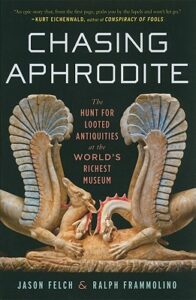 Chasing Aphrodite: The Hunt for Looted Antiquities at the World’s Richest Museum, Jason Felch & Ralph Frammolino
Chasing Aphrodite: The Hunt for Looted Antiquities at the World’s Richest Museum, Jason Felch & Ralph Frammolino
Chasing Aphrodite is not just about the “Aphrodite” statue that proved a flashpoint for the Getty Museum after it became clear it was most likely looted from a site near Morgantina. It is, as the subtitle says, about the looted antiquities, the changing attitudes toward that, and the long legal cases that forced American institutions and collectors to change their acquisition policies and return looted art. In some ways, it’s a biography of Marion True, a curator at the Getty who was instrumental in the acquisition of many of the looted antiquities, while also becoming a strong voice for restoration and refusal to purchase such items.
I found it surprisingly suspenseful — if that’s the right word. I wanted to find out what ended up happening; I didn’t remember enough about the events described (many of which hit the news when I was a teen) to remember how things worked out exactly, though it was obvious that the Getty were running their collective neck into a noose. The narrative is fairly dispassionate but nonetheless makes it deeply obvious that what the Getty were doing was wrong, suspect even under their own lax policies.
As a note, the book isn’t pro-repatriation per se. It seems fairly ambivalent about other repatriation requests, like the Elgin Marbles, striking a note that seems to call some of that type of request “unreasonable”, at the end. It casts Marion True as a fairly sympathetic figure in many ways, despite her deep culpability. She was at least as deeply implicated as other figures at the Getty, and a little honesty and self-examination might have helped her weather the storm.
Still, really fascinating.
Rating: 4/5
Tags: book reviews, books, history, Jason Felch, non-fiction, Ralph Frammolino
 Dinner in Rome: A History of the World in One Meal, Andreas Viestad
Dinner in Rome: A History of the World in One Meal, Andreas Viestad








